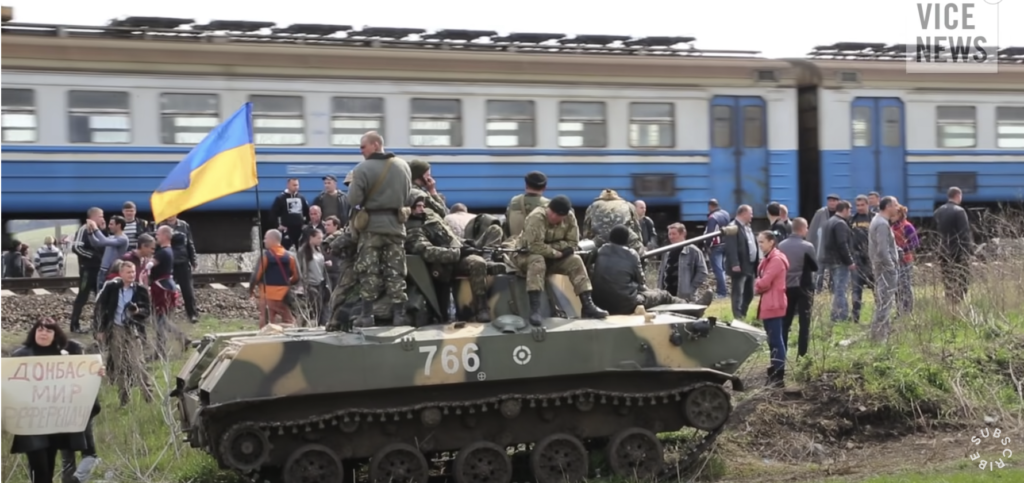The BBC: a giant propaganda unit promoting the Ukrainian cause

In 2015 a BBC documentary on You Tube showed us the remarkable scene of a Ukrainian military unit trying to enter the outskirts of Slovyansk in the Donbas.
Old men, young boys, large women came out to stop them. Some climbed on the tanks and other armoured vehicles. Some seized the soldiers’ weapons and disabled them. The entire unit was told by the villagers to turn around and go back to base, which it did.
A documentary from VICE News, showing much the same scenes, can still be found online here:
Ukrainian Military Give Up Their Weapons: Russian Roulette
That was BBC in 2015. We don’t see much like that now. That famous documentary, Slovyansk 2015, has been withdrawn, it seems. The BBC has turned itself into a giant propaganda unit promoting the Ukrainian cause.
Its aggressive, flinty-eyed commentator, Ros Aitkins, who in 2015 would stare into the camera to warn us about Nazi-style ultra-nationalists trying to take over Ukraine, now has a documentary clip where he tells us with equal aggressiveness that pro-Nazis and ultras are tiny in number and talk of their threat is grossly exaggerated.
How can societies protect themselves from media fabrications? They, together with the spy-military-industrial complex influence on mainstream media, can create whatever national consensus they like, pushing societies around like rubber duckies in a jacuzzi.
They once created a national consensus telling us the pro-Hanoi nationalists in Vietnam were the puppets of Beijing who had to be destroyed. Today they tell us these are fine people crucial to stopping the China threat heading south.
That alleged threat is yet another product of their propaganda efforts. They are also busy, and successful, over Ukraine.
In the sixties working in Australian Embassy, Moscow, I visited Kiev and Donbas twice en route to Crimea. Nowhere did I hear a word of Ukrainian spoken. I went back to Crimea again in 2017 after more than 60 years of Ukrainian occupation and it was still the same – almost completely Russian speaking apart from a small Tartar minority hidden away in the countryside and a few tattered Ukrainian road signs by the wayside.
True, language does not always decide national identity. Some of the soldiers fighting for Ukraine are speaking perfect Russian in TV interviews.
But that is no excuse for casting aside the Minsk agreements of 2014-5 promising autonomy to the two Russian speaking Donbas provinces of Luhansk and Donetsk. It was signed by France, Germany, Russia and Ukraine following the US-backed Maidan uprising inspired by the very same pro-Nazis and ultras whose influence the BBC denied.
It has since been discarded by most of its signatories as a trick to give Ukraine time to strengthen its military.
The world has been suffering ever since.